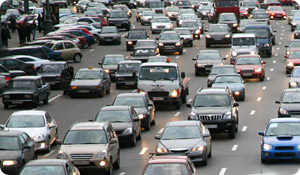
Driving to a destination is often the most ideal way to go. You don't have to contend with long lines, flight delays, or metal detectors. Best of all, you're the master of your own itinerary: leaving when you're ready and not when you have to, stopping when the need arises, and exploring the back roads along your route if you so desire. But if you're the one behind the wheel, you face a major danger: driver fatigue. According to the National Highway Traffic Safety Administration (NHTSA), about 100,000 car accidents each year, 1,500 of which result in fatalities, are fatigue-related. Read on to protect yourself from becoming another statistic.
1. Stay well hydrated. Although experts recommend two cups of coffee if you're feeling really tired and need to keep driving, you should limit your caffeine intake. If you consume more than 300 milligrams (or a little more than three cups of coffee or a 32-ounce serving of soda), you're likely to feel restless and fidgety-and as a result, you may have trouble concentrating. If you're not sleep-deprived, you're better off drinking about a liter of ice cold water for every two hours on the road to help you stay alert.
2. Take plenty of pit stops. Giving yourself a 10-minute breather every hour or so will go a long way in keeping your trip pleasant and safe. The American Automobile Association recommends stopping every 100 miles. And don't forget to stretch: Stretching exercises will improve circulation to your muscles and, perhaps even more important, your brain.
3. Avoid fatty, sugary foods, especially in large doses. Fat tends to slow down the digestive process, so the flow of blood is directed away from your brain (where you need it most while driving) and toward your stomach for longer, making you sleepy and inattentive. Too much sugar and refined carbohydrates can deprive your brain of glucose, its only source of energy, and therefore affect your ability to concentrate. Fruits and vegetables are rich in the glucose your brain needs, and lean protein will give you a boost in more ways than one: A 2006 Dutch study found that if one-third of a person's caloric intake comes from lean protein, her body is more likely to burn fat and calories at a higher rate.
4. Get a good night's sleep. It should go without saying that if you're planning on hitting the road, the first thing on your to-do list should be to get plenty of z's. But the NHTSA found that most drivers involved in fatigue-related accidents were operating on just six hours of sleep, and many more had slept less than five hours. Seven to eight hours of quality bed time will leave you in optimal driving condition. And if your eyelids start to droop while you're on the highway, pull over at the nearest rest area and take at least a 15-minute nap. The time you lose doing that could translate into lives saved, including yours.





